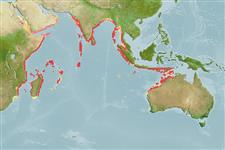>
Eupercaria/misc (Various families in series Eupercaria) >
Caesionidae (Fusiliers) > Caesioninae
Etymology: Caesio: Latin, caesius, bluish-grey, 1835; it is the same name given to the silvery metal (Cs) (Ref. 45335).
More on author: Bleeker.
Environment: milieu / climate zone / depth range / distribution range
Ecologie
marien rifbewoner; standvastig; diepte 0 - 50 m (Ref. 402). Tropical; 23°N - 28°S, 32°E - 132°E (Ref. 94071)
Indian Ocean: East Africa (not including the Red Sea and the Arabian (Persian) Gulf) to Indonesia. Records of this species from the Marshall Islands and Australia are probably misidentifications of Caesio teres.
Grootte / Gewicht / Leeftijd
Maturity: Lm ? range ? - ? cm
Max length : 40.0 cm TL mannelijk / geslacht onbekend; (Ref. 402)
Dorsale stekels (totaal) : 10; Dorsale zachte stralen (totaal) : 14 - 15; Anale stekels: 3; Anale zachte stralen: 11 - 12. Upper 1/3 of body and caudal fin bright yellow, middle third blue, lower white. 4-5 scales on cheek; 20-25 predorsal scales; scaled dorsal and anal fins; narrow scaleless zone interrupting the Supra-temporal band of scales at the dorsal midline. Upper peduncular scale rows 11 or 12; lower peduncular scale rows usually 15 (14-16). Presence of a small process on each ventrolateral surface of basioccipital for attachment of Baudelot's ligament. Post maxillary process single; posterior end of maxilla blunt (Ref. 1723). Head length 3.0-3.4 in SL; body depth 2.9-3.5 in SL (Ref. 90102).
Inhabits deep lagoons and along seaward reefs (Ref. 9710), primarily around coral reefs. Feeds on zooplankton in large midwater aggregations. Oviparous, with numerous, small pelagic eggs (Ref. 402).
Levenscyclus en paargedrag
Maturities | Voortplanting | Spawnings | Egg(s) | Fecundities | Larven
Carpenter, K.E., 1987. Revision of the Indo-Pacific fish family Caesionidae (Lutjanoidea), with descriptions of five new species. Indo-Pac. Fish. (15):56 p. (Ref. 1723)
Status op de Rode Lijst van het IUCN (Ref. 130435)
Gevaar voor de mens
Harmless
Gebruik door de mens
Visserij: van minder commercieel belang
Tools
Speciale rapporten
Download XML
Internetbronnen
Estimates based on models
Preferred temperature (Ref.
123201): 26 - 29.3, mean 28 °C (based on 312 cells).
Fylogenetische diversiteitsindex (Ref.
82804): PD
50 = 0.5020 [Uniqueness, from 0.5 = low to 2.0 = high].
Bayesian length-weight: a=0.01259 (0.00551 - 0.02875), b=3.09 (2.90 - 3.28), in cm total length, based on LWR estimates for this (Sub)family-body shape (Ref.
93245).
Trofisch niveau (Ref.
69278): 3.4 ±0.45 se; based on food items.
Weerstandsvermogen (Ref.
120179): Hoog, minimale populatieverdubbelingstijd minder dan 15 maanden (Preliminary K or Fecundity.).
Fishing Vulnerability (Ref.
59153): Low to moderate vulnerability (30 of 100).
Nutrients (Ref.
124155): Calcium = 53.2 [35.4, 76.6] mg/100g; Iron = 0.708 [0.466, 1.023] mg/100g; Protein = 19 [18, 20] %; Omega3 = 0.138 [0.096, 0.196] g/100g; Selenium = 33.1 [21.1, 55.5] μg/100g; VitaminA = 99.1 [41.3, 244.0] μg/100g; Zinc = 1.1 [0.8, 1.5] mg/100g (wet weight);
